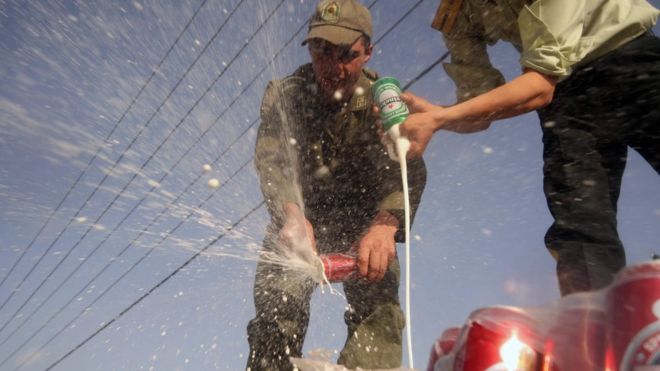Death toll from bootleg alcohol in Iran rises to 42
Alcohol is illegal for Muslims in Iran but bootleg booze is widely available on the black market

A free daily email with the biggest news stories of the day – and the best features from TheWeek.com
You are now subscribed
Your newsletter sign-up was successful
The death toll in Iran from a recent spate of incidents involving bootleg alcohol has increased to 42, the country's government has announced.
In the past three weeks, at least 460 people across five provinces have been hospitalised, “with the youngest victim a 19-year-old woman”, says the BBC.
Police in the southern city of Bandar Abbas last week arrested a couple for allegedly producing homemade alcohol.
The Week
Escape your echo chamber. Get the facts behind the news, plus analysis from multiple perspectives.

Sign up for The Week's Free Newsletters
From our morning news briefing to a weekly Good News Newsletter, get the best of The Week delivered directly to your inbox.
From our morning news briefing to a weekly Good News Newsletter, get the best of The Week delivered directly to your inbox.
According to Sky News, state TV quoted the head of the medical school in Hormozgan province, where Bandar Abbas is located, as saying 123 people had sought help for alcohol poisoning.
Since the 1979 Islamic Revolution, alcohol has been banned in Iran and punishable by floggings and cash fines.
Iran's Islamic penal code states that the punishment for consumption of alcohol by a Muslim is 80 lashes.
There is however “an exemption for non-Muslim citizens to produce alcohol for their own consumption or for religious purposes, like the Eucharist”, says the BBC.
A free daily email with the biggest news stories of the day – and the best features from TheWeek.com
Despite the strict alcohol ban, “many Iranians drink foreign and homemade alcoholic beverages that are available on the black market”, says Radio Free Europe.
Iranian officials estimate that up to 80 million litres of alcohol worth $730 million (£560m) are smuggled into the country every year.
According to the BBC’s Rana Rahimpour it is not unusual for tainted alcohol to cause injuries or deaths in Iran, but what is surprising is the significant number of deaths and the spread of the problem to the provinces.
Analysts spoken to by the BBC believe the economic impact of the US pulling out of the Iran nuclear deal may be playing a part.
It is thought that the cause of the deaths could be the fact that ethanol is sometimes replaced with the toxic methanol in the contaminated drink.
-
 The Week Unwrapped: Have televised confessions quelled protests in Iran?
The Week Unwrapped: Have televised confessions quelled protests in Iran?Podcast Plus, why has Elon Musk turned from Mars to the Moon? And will the BBC prove to be a puzzles champ?
-
 The week’s best photos
The week’s best photosIn Pictures An Andean god, a rogue squirrel, and more
-
 AI surgical tools might be injuring patients
AI surgical tools might be injuring patientsUnder the Radar More than 1,300 AI-assisted medical devices have FDA approval
-
 Epstein files topple law CEO, roil UK government
Epstein files topple law CEO, roil UK governmentSpeed Read Peter Mandelson, Britain’s former ambassador to the US, is caught up in the scandal
-
 Iran and US prepare to meet after skirmishes
Iran and US prepare to meet after skirmishesSpeed Read The incident comes amid heightened tensions in the Middle East
-
 Which way will Trump go on Iran?
Which way will Trump go on Iran?Today’s Big Question Diplomatic talks set to be held in Turkey on Friday, but failure to reach an agreement could have ‘terrible’ global ramifications
-
 Israel retrieves final hostage’s body from Gaza
Israel retrieves final hostage’s body from GazaSpeed Read The 24-year-old police officer was killed during the initial Hamas attack
-
 China’s Xi targets top general in growing purge
China’s Xi targets top general in growing purgeSpeed Read Zhang Youxia is being investigated over ‘grave violations’ of the law
-
 Panama and Canada are negotiating over a crucial copper mine
Panama and Canada are negotiating over a crucial copper mineIn the Spotlight Panama is set to make a final decision on the mine this summer
-
 Iran unleashes carnage on its own people
Iran unleashes carnage on its own peopleFeature Demonstrations began in late December as an economic protest
-
 How oil tankers have been weaponised
How oil tankers have been weaponisedThe Explainer The seizure of a Russian tanker in the Atlantic last week has drawn attention to the country’s clandestine shipping network